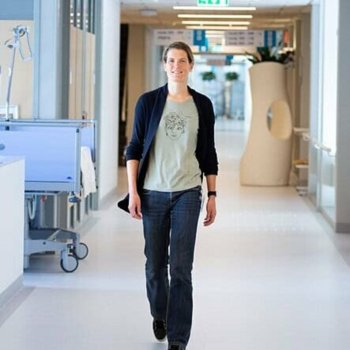This is how mathematical models can save the lives of premature babies
Naturally, we wish to avoid giving premature newborns any serious conditions as much as possible. An early warning system is beneficial.
“Every day, I look at how we can use technology to give babies a better start,” says Carola van Pul, clinical physicist at Máxima MC (MMC) and professor of clinical physics at the Eindhoven University of Technology (TU/e). She researches how technology can improve the treatment of patients in the hospital and has focused in recent years on improving technology in the Neonatal Intensive Care Unit (NICU). “Newborns lie in big, buzzing incubators to keep them warm, with a lot of beeping and flashing devices around them. To ensure thorough monitoring of all their processes, their tiny bodies are covered in stickers fastened to cables. That’s not a comfortable situation,” Van Pul said.
To change that, one of the things she is working on is the development and implementation of new sensors that do not adhere to stickers but are under the mattress. Some sensors can measure specific data with a wireless, soft band. “That way, a premature baby’s skin doesn’t get damaged and is much more comfortable. Wireless sensors make it easier for parents to hold and care for their babies. This is essential for the bond between parent and child. Moreover, pouching (skin-to-skin contact, ed.) is good for a baby’s development and growth.”
Early Birth
In the Netherlands, about 7 to 8% of children are born prematurely, that is, before 37 weeks of pregnancy. These babies often need extra care, partly in the NICU. Especially severe premature babies – born before 32 weeks of pregnancy – often receive intensive and long-term care.
Early warning
In recent years, Van Pul – together with a team of doctors and nurses – has been working on the development of early warning systems. As the name suggests, these systems notice changes in the body early. “Now the system is set up so that the alarm only goes off when the baby’s health is critical, for instance, when the heart rate and saturation drops drastically. We can often see such a situation coming up. Therefore, we are now developing mathematical models to predict a critical situation earlier.” For example, heart rate variability often changes before the heart rate actually drops. Motility is another crucial indicator; a baby often moves considerably less when things are not likely to go well.
....
Read the full article on the website of TU Eindhoven.
